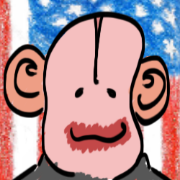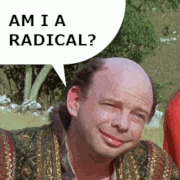(Thread IKs:
dead gay comedy forums)
|
see, you've been touching computers too much. those are average sized cargo pockets as are the pockets of the extremely working class dickies that I wear to work. this is the biggest book that will fit in them and I have to kind of massage it to get it to go in https://www.amazon.com/Essential-Works-Lenin-Other-Writings/dp/0486253333
|
|
|
|

|
| # ? May 26, 2024 10:19 |
|
https://twitter.com/KBStarFlower/status/1546596616487985152
|
|
|
|
there's gonna be at least one My Little Pony fan who shows up and gets very confused
|
|
|
|
|
Big session debating whether Ponyville’s socialist at #Trotcon22. Join us this weekend at Occidental College in northeast LA #trotcon2022
|
|
|
|
socdempolyclop
|
|
|
|
my little pony: friendship betrayed
|
|
|
|

|
|
|
|
each one teach one I say before reading the origin of the family with my pony tulpa
|
|
|
|
D&D 1972: Marx AD&D: Lenin BECMI: Stalin 3rd Edition: Kautsky 4th Edition: Mao 5th Edition: AOC GURPS: Trotsky Pathfinder: Deng
|
|
|
|
Wow the "x the hedgehog" meme doesn't seem to hold true for Trotsky Here's Stalin though lol 
|
|
|
|
this post should trigger an immediate ban +30
|
|
|
|
Is there a good companion for Capital vol. 1? Like an online course or another book?
|
|
|
|
Cheston posted:Is there a good companion for Capital vol. 1? Like an online course or another book? I used David Harvey lectures when I read it https://youtube.com/playlist?list=PLWvnUfModHP9Ci8M1g39l4AZgK6YLCXd0 He's also got a written companion I believe
|
|
|
|
I'm sure a lot of the stuff is crossover but he also has an older lecture. That's the one I used when I tried reading capital. https://www.youtube.com/watch?v=gBazR59SZXk&list=PL0A7FFF28B99C1303 e: David Harvey also has a website which might also be a good resource. http://davidharvey.org/reading-capital/ AnimeIsTrash has issued a correction as of 02:38 on Jul 12, 2022 |
|
|
|
Cheston posted:Is there a good companion for Capital vol. 1? Like an online course or another book? I also like William Clare Roberts’ Marx’s Inferno, even tho it’s not billed as a “companion” per se. I think it’s come up in this thread before?
|
|
|
|
drat.
|
|
|
|
gradenko_2000 posted:D&D 1972: Marx SPECIAL: you
|
|
|
|
MSDOS KAPITAL posted:I'm referring to mode of production as well. it seems the cultural revolution was a big success
|
|
|
|
Woodpeckers work on the excavation of wood. The bills are their tools. Striking their sharp-nosed hammers with a signature mechanical sound, they can bore mouth-sized holes into tree trunks, like shafts for mining ants and termites, beetles and their grubs. Because the tools are at one with the bodies of the birds, they cannot be concentrated. No master woodpecker can collect bills and pile them up on a central site and tell the other members of the population, their faces strangely flat, to submit to his command and get access to the tools they need to break through the bark or refuse and starve in freedom: for this reason, if for no other, property relations among woodpeckers are impossible. Their equipment for metabolism cannot be distributed between owners and non-owners, nor can it be collectively controlled by a commune. This is the essence of ‘property relations’: a matrix of positions for the members of the species vis-à-vis the means of production. Or, in the more elaborate definition given by Brenner: quote:By property relations, I mean the relationships among the direct producers, among the class of exploiters (if any exists), and between the exploiters and producers, which specify and determine the regular and systematic access of the individual economic actors (or families) to the means of production and to the economic product, – a set of rules, as it were, for how humans relate to their equivalents of bills and beetles.1 Now humans create, of course, toolboxes infinitely larger and more varied than their own bodily organs. ‘Nature,’ Marx says, is their ‘original tool house,’ out of which they assemble advanced implements for spinning, boring, grinding, pressing, cutting, throwing, pumping and any number of other activities. Humans alone can fan out over the earth as a whole, construct instruments out of whatever useful material they encounter and annex them to their bodies: make the earth an ‘inorganic body,’ in Marx’s words – a sort of prosthetic extension of themselves.2 No other species can be so flexible, so universal, so omnivorous in relation to the rest of nature – but for the very same reason, no other species can have its metabolism organised through such sharp internal divisions.3 If a broad set of extra-somatic tools is a distinctive feature of Homo sapiens sapiens, it is also the point where that species ceases to be a unity. Precisely because the bills required for breaking through the bark of matter may draw upon all forces of nature and open the wide earth for appropriation, some humans can be cut off. A material, a machine, a prime mover can become private property. The individual might need them like she needs her own lungs, but they are outside of her body, caught by others in a net, versatile and off-limits, and so she may have no choice but to go via a master to access them: she is snared in property relations. Before that capture happens, human beings are a bit like woodpeckers, in the sense that they are united with their means of production – not physically, but socially. On the land, in the household and the guild, farmers and artisans possess their own tools, the individual producer relating to the earth as ‘the workshop of his forces, and the domain of his will,’ still at one with the means ‘like the snail with his shell’.4 Capitalist property relations begin the moment that bond is broken. Deprived of what they need for their subsistence, ex-farmers and ex-artisans no longer own anything but a capacity to perform labour, or labour power, naked and unequipped, a mere potential screaming for tools with which to work. On the opposite side of the fence, they confront a class monopolising those same means of production as private assets. A historical divorce has occurred, in which producers and means have been separated from each other. But the distance cannot be allowed to last. If people who own nothing but their own labour power never got in contact with the means of production, they would be unable to work and feed themselves: ‘No boots can be made without leather.’5 If, on the other hand, the land, the frames, the piles of leather remained untouched by the fingers and hands of working people, nothing would come out of them, and they would be of no worth to their proprietors. While the separation is the unshakable foundation for capitalist property relations, it has to be overcome, momentarily but continuously, for society to reproduce itself: producers and means must be reunited. Now the capacity of a living person to perform labour – her ability to exert muscles and mind, expend energy, operate her body parts during hours of concentration and strain – is quite a different thing from a pound of leather or a mule or a wheel; indeed, these are incommensurable entities. Hence their reunification can come about only via the mediation of a universal equivalent against which anything can be exchanged and in whose reactor all qualitative characters dissolve: what we know as money. The worker needs money too. She sells the right to dispose of her sole property – her labour power – for specified periods of time, in return for a quantum of the universal equivalent – the wage – with which she can purchase the goods needed for her metabolism. Both at the end and at the beginning of the cycle, she possesses commodities: first her labour power, then a sack of potatoes and a fresh set of cutlery and a dingy apartment covered for another two weeks. The formula she follows is Commodity – Money – Commodity, or C – M – C for short.6 The one C is distinguished from the other by its qualities, or its use-value: bare labour power is of no utility to its owner, but food and utensils and shelter are essential objects of consumption. But now consider an agent who starts off with money. Venturing out on the market, it is he who purchases labour power and means of production – say, a hundred workers ready to weave and be paid for two weeks at a time, a factory building, a steam engine, power looms, warp and weft – and thereby affect the reunion like an indispensable matchmaker. The result is a fine calico, which he sells on the market. For this he gets money. The cycle has come to a first end, in accordance with an opposite formula: M – C – M, beginning with money and ending with money, the commodity phase a mere passage to the ultimate goal. But why change money for money? One sum of money cannot be distinguished from another in quality, only in quantity. The sole point of the exercise is the difference between the amount of money thrown into circulation and the amount yielded at its end – to pocket an increment in exchange-value, or, simply put, to make more money. The full formula is thus M – C – M´, the M with a prime signifying that the sold commodities command higher exchange-value than the ingredients acquired to produce them. Our agent has garnered a profit. That is the whole purpose of the procedure, and given the chasm between labour power and means of production as commodities on a market, there can be no other. The two are brought back together in the hands of the capitalist, inserting himself as a permanent ‘middle-man’ or screen between the partners, purchasing them with the single aim – he has spent money, after all – of reaping a monetary gain.7 In a society that has undergone the historical divorce, capital is the necessary medium for arranging a productive rendezvous between incommensurable entities that can never be discontinued nor fully completed. The interpolation must never cease. ‘I conceive that a capitalist will not risk his money in business without he covers a profit,’ said cotton manufacturer G. A. Lee from Manchester to a Parliamentary commission in 1816.8 He would never do so if he expected to make a loss. If the business forecast told him he would get back 95 percent of his initial outlay, the capitalist would be wise to keep the money in his bank account; if it said he would stand a good chance of getting 100 percent of the expenses covered but no more, he would still be prudent to abstain from the investment. The effort would be pointless. One might perhaps imagine a capitalist who repeatedly banks on his own losses, but this person would be a mad deviant guaranteeing his own disappearance; similarly, one could visualise a capitalist who keeps placing his assets in ventures that give him zero in return but no losses – perhaps this is a philanthropic gentleman who appreciates the outlets for what they actually do. He would certainly not be a very successful capitalist, rather running the risk of being overtaken by others who have adopted the full formula: anything else than the profit motive requires sacrificial dispositions on his part. The sole rational goal for him as a capitalist is profit. Logically and historically, the quest for it is inscribed into capitalist property relations as their one ‘driving fire’.9 So the capitalist cares naught for the material qualities of his goods: ‘He does not manufacture boots for their own sake,’ nor cutlery to put on his own table, nor houses to accommodate his children, but items to be sold to others. But he cannot sell the idea of boots or cutlery or houses. For his goods to attract demand, they must be such articles, endowed with a minimal use-value of allowing for walk on uneven terrain, scooping up food or shielding against cold and rain. To earn his profit, the industrial capitalist must take a detour through nature, setting up some version of ‘the metabolic interaction [Stoffwechsel] between man and nature, the everlasting nature-imposed condition of human existence’ within his precincts. Here the materials of nature are appropriated not for their own concrete comforts, but for the sole purpose of embodying exchange-value: ‘Use-values are produced by capitalists only because and in so far as they form the material substratum of exchange-value, are the bearers of exchange-value.’10 ... Capital is quantitative in nature: thus it recognises no end point. It reconverts the profit from the first circuit into more labour power and means of production for the next, moving on relentlessly through reinvestment, ‘expanded reproduction’ or simply accumulation of capital; it resumes production on a larger scale, and on a larger scale again, so that the Stoffwechsel ‘changes into a spiral’.16 For every consecutive circuit, capital will ceteris paribus appropriate greater chunks of nature. ... If output were to be fixed, the profit from the first cycle could not be reinvested in additional machinery and workers in the next: it would have to be consumed, devalued or both. The only way for capital to throw it back into production and keep accumulating at the same rate of profit would be to pay workers less, fire some of them while output stays the same, avoid taxes or obtain subsidies and other services from the state – measures whose potentials would quickly be exhausted. ‘When growth is impossible, further accumulation of profits by capital can only have the effect of continuous transfer of income from wages to income from property,’ or, ‘in other words, if profits cannot be made by growing the pie, it is to be done by cutting the rest in smaller slices.’18 That strategy is doomed to hit a wall. Rates of exploitation cannot rise indefinitely; at some point, the rate of profit would inevitably slide down towards zero, and since it is the lure of profit that motivates investment, capitalists would simply cease operations and refuse to set production in motion – or move their capital to someplace else, where the constraint on output does not apply. Then there is also the hypothetical possibility that GDP could grow while throughput stays flat or falls thanks to a declining material intensity of production, a decoupling of value and nature. Whence, then, does profit come? Hidden within the production phase – C…P…C´ – there must be some source of increase in exchange-value, something with the curious ability to create more such value than it costs: what is it? The Marxian answer to this riddle is, of course, labour power. If it takes four hours for a power loom weaver to produce cloth whose exchange-value equals her wage, she might well go on working for another four or six or eight hours, even though her reproduction – potatoes, cutlery, rent – has already been secured. If I buy a bicycle, the cost of it bears no relation to the distance I can go with it; within its physical capacities, I can spin the pedals for a time entirely unrelated to the price.19 A similar blessing is bestowed upon the capitalist, with the critical difference that the commodity of labour power does not have a particular use-value like the bike (transportation from A to B) but the general use-value of generating fresh exchange-value: once she has worked for the four hours required to cover her wage, the operative can be spun to continue manufacturing cloth, or whatever other commodity is being produced, for sale on the market. During the remainder of the day, she produces surplus-value, which becomes profit when related to the invested capital as a whole, so that capital accumulation is in fact the production of surplus-value: ABC of Marxism, and still the most plausible account around. After all, labour is the activity that sets anthropogenic products apart from those of raw nature; if profit had any other source, ‘money would be growing magically on trees’ and capitalists could just walk around picking it like a golden fruit. Thus capitalist property relations give rise to 1) the profit, 2) the compulsion to chase it incessantly, 3) the necessity of growing material throughput – all stemming from the fundamental intra-species fracture. Capital is the expanding gas forming in the cracks and hollows between the better part of humanity and the rest of nature. By its very definition, it is the circulatory, spiral-like process of valorisation or self-expanding value; but it is also – by its very definition – the relation between capitalists and workers, for capital exists ‘only by sucking in living labour as its soul, vampire-like’; but if labour is its soul, extra-human nature is its utterly corporeal body. In the tracks of self-expansion, capital must deposit a ‘mass of commodities’ that is ‘constantly growing,’ a mountain range of transformed matter rising through the social ridges.21
|
|
|
|
gradenko_2000 posted:Woodpeckers work on the excavation of wood. The bills are their tools. Striking their sharp-nosed hammers with a signature mechanical sound, they can bore mouth-sized holes into tree trunks, like shafts for mining ants and termites, beetles and their grubs. Because the tools are at one with the bodies of the birds, they cannot be concentrated. No master woodpecker can collect bills and pile them up on a central site and tell the other members of the population, their faces strangely flat, to submit to his command and get access to the tools they need to break through the bark or refuse and starve in freedom: for this reason, if for no other, property relations among woodpeckers are impossible. Their equipment for metabolism cannot be distributed between owners and non-owners, nor can it be collectively controlled by a commune. 
|
|
|
|
i like the bit where marx is going through all the liberal economists' explanations for where profit comes from, like it's just that each capitalist is ripping each other capitalist off and yet somehow all of their bank accounts are growing at once
|
|
|
|
ive been thinking about the dreaded culture war (specifically wrt abortion) and wanted to get some orthodox marxism injected into this idea: is it correct to view the more socially reactionary faction of the bourgeois as people who view their social class as a proxy for their economic position? ie """woke capital""" (i hope ive put enough scare quotes on that) views the issue as defusing and redirecting social unrest while the reactionaries think of an attack on social order as a direct attack on economic order? i assume smarter people have already written about this
|
|
|
|
Azathoth posted:I miss Zorak you have the power to deal with this person everyone hates
|
|
|
|
ferrinus is a voight-kampff test for mods and you're failing
|
|
|
|
croup coughfield posted:ferrinus is a voight-kampff test for mods and you're failing did WE have an argument at any point? like involving your own beliefs about anything?
|
|
|
|
Ferrinus posted:did WE have an argument at any point? like involving your own beliefs about anything? shut up
|
|
|
|
I'll go ahead and put my hated mendelite take out again. in so far as there's a human element that can't yet be automated out a production cycle, that element will be more effecient, produce more value the smarter and better educated it is. forcing poor young girls to be breeding stock is not going to produce an educated workforce, it's going to produce the opposite. if domestic talent can't be reproduced, it needs to be imported, where america is lining up on the facist regressive side of modern civilization will discourage immigration of educated labor. labor's collective intelligence and knowledge is a big factor in its power as a productive force, it determines what can be produced and how well and fast it can be produced. of course, the smarter and better educated labor is, the less likely it is to suffer capital's bullshit. so if america can roll back everyone's rights and replace all professional class type labor with obedient automation, it will be a big win for capital. as automation requires an educated workforce to design and implement, this isn't going to happen, it would be a contradictory outcome in a country that is hell bent on making its citizens and dumb and ignorant as possible. america's side on the culture war is detrimental to the acculation of capital. also, it would be better to think of "woke capital" just in terms of a willingness to offer concessions to labor in order to maintain a labor force capable of doing engineering and information tech kind of work. like it's not a position based on moral good, it's betting that the returns from being able to do high tech productive endeavors will outweigh the risks of having people capable of carrying out those endeavors
|
|
|
|
The companies that make the most out of equality PR campaigns are those with limited labour pools due to restrictions like skill levels and so they want to be able to attract as much of that pool as possible and/or are those selling commodities are sold to a massive range of the working class for the same reason. It's not a deliberate strategy beyond pretty immediate self interest, which is why they'll not change their logos for Pride month on sites aimed at countries/communities where that's the unpopular thing to do. The same is pretty much true for the inverse - bigotry can get you a niche marketing space so some companies lean into it and the 'neutrality' of wages and profit usually mean they keep functioning without too much of a problem even in areas when personal bigotry of the same kind would get a person shunned. For those that actually do take a specific strategic role in being reactionary then I think they're often pursuing their own particular basis of class power. Slave owners were being threatened economically by abolitionist advances regardless of the morality involved, patriarchal relations in the working class household do compensate (in a value sense) the male proletarian above their wage earned from their labour, obviously below that of fully gender equal class conscious alliances and action but enough to quell some level of labour unrest. It's not about confusing social order in a general sense with economic power but seeing the links between how changes to social order obviously impact economic positions and responding accordingly.
|
|
|
|
it's better to think of capitalism as a bunch of stupid and autonomous feedback mechanisms butting heads with each other rather than being the execution of any kind of master plan. banning abortion has both benefits and drawbacks, and those accrue to different sectors of capital, and which sector gets its way at a given historical moment is kind of random there ARE benefits, though. like when all those companies immediately promised that THEIR employees would get all-expenses-paid flights to new york or canada or whatever if they needed abortions, maybe that costs those companies a little extra, but it also chains employees to their desks much more strongly than before. so it's not a situation where literally everyone (in the ruling class) wins, but certainly enough capital can benefit in the short term that it's not going to bother pushing back very hard Ferrinus has issued a correction as of 21:50 on Jul 13, 2022 |
|
|
|
https://twitter.com/bidetmarxman/status/1547237104593145856quote:When reading predictions on the collapse of dollar hegemony, it can be hard to grasp what it means in material terms: dedollarization is going to make for some interesting times shame about all the fascists though
|
|
|
|
NY has diamond mines?
|
|
|
|
Danann posted:dedollarization is going to make for some interesting times shame about all the fascists though it comes back to de Gaulle being very right when he correctly called the United States out for that: the exorbitant privilege of the dollar. A sizeable portion of the ridiculous poo poo seen in financial capitalism coasts entirely on this so it's deffo A Thing
|
|
|
|
In Training posted:NY has diamond mines? it's where all the diamonds go to be made into their value added jewelry form the raw materials come from elsewhere naturally
|
|
|
|
StashAugustine posted:ive been thinking about the dreaded culture war (specifically wrt abortion) and wanted to get some orthodox marxism injected into this idea: is it correct to view the more socially reactionary faction of the bourgeois as people who view their social class as a proxy for their economic position? ie """woke capital""" (i hope ive put enough scare quotes on that) views the issue as defusing and redirecting social unrest while the reactionaries think of an attack on social order as a direct attack on economic order? i assume smarter people have already written about this This is something I have been wondering about too. It just seems like a "fight" between 2 bourgeoisie in which one lost. I guess for a more materialistic explanation for abortion it's just they were concerned with white birthrates?
|
|
|
|
AnimeIsTrash posted:This is something I have been wondering about too. It just seems like a "fight" between 2 bourgeoisie in which one lost. I guess for a more materialistic explanation for abortion it's just they were concerned with white birthrates? Yeah idk- I think there's some demographic arguments you could make, but the issue is that I think there's been a consistent baseline anti-abortion sentiment and this isn't really the result of a sea change but rather the reactionaries getting lucky a couple times in a row. Now that I say it maybe that's a better way of looking at it- reaction won for a while in general, and that had more strictly materialistic causes and motives, and while they're at it they enforced their cultural preferences- which are related to their class position and how they think of it but not directly so.
|
|
|
|
Danann posted:https://twitter.com/bidetmarxman/status/1547237104593145856 thanks for this. among other things it's a great explanation of how imperialism benefits regular us citizens in practice even if on paper it looks like it's only raytheon or w/e that's coming out ahead
|
|
|
|
Ferrinus posted:it's better to think of capitalism as a bunch of stupid and autonomous feedback mechanisms butting heads with each other rather than being the execution of any kind of master plan. banning abortion has both benefits and drawbacks, and those accrue to different sectors of capital, and which sector gets its way at a given historical moment is kind of random i was thinking of another thing about "woke capital," in that the U.S. industry is less production nowadays but more branding / concepts / marketing for commodities produced elsewhere, so it's not that pride branding is necessarily cynical (although it can be), but it carries a class stamp and is wrapped up in (bourgeois) idealist notions about narratives and depictions of the world being the driving force of events. "stakeholder capitalism" in practice, really, but at the level of representation.
|
|
|
|
the white nationalist all-american patriotic "post-left" or "patriotic socialists" or whatever you want to call them, while positioning against "woke capital," also reflect a similar thinking. socialism becomes like a branding exercise around various aesthetic signifiers to guile trump supporters into "socialism" with a message of "well you hate them, that means you'll like us" like liberals employ to get people to vote for them despite the fact that they have no platform or capability. and that involves branding which is the art of making something appear that it's not. and that has a class character. if i see someone rail against "PMCs," i'd bet the person works in some branding firm or marketing company, basically they are what they rail against often enough, but the inner logic reflects the logic of the industry. thing is, i think both that and this left-liberal kind of reaction to class politics that deems such a thing "class essentialism" are twin phenomena, the "patriotic socialists" would negate anti-racism (to negate this is racism) for "class politics" while the left-liberal types seek to off-hook the struggle against racism from the class struggle. and i think mainly these petit-bourgeois bubbles have been occurring in reaction to a historic rise in more basic and working-class movements including labor organizing in low-wage sectors that are heavily non-white and where women outnumber men. "messaging" is what counts for the others, not organization or having real skin in the game which has a way of grounding one's politics. BrutalistMcDonalds has issued a correction as of 00:26 on Jul 15, 2022 |
|
|
|
The Voice of Labor posted:the smarter and better educated labor is, the less likely it is to suffer capital's bullshit or they'll just come up with more sophisticated arguments to convince themselves and each other that capital's bullshit is good, actually
|
|
|
|

|
| # ? May 26, 2024 10:19 |
|
MSDOS KAPITAL posted:lmao propagandas propaganda and we know the western working and middle classes benefit from their position within the global hierarchy. Making them hesitant to turn against it, despite their own labour and value being parasitised. (I might be a disenfranchised piece of poo poo but atleast I can watch netflix on my enormous TV that didn't even cost a weeks wages.)
|
|
|














































